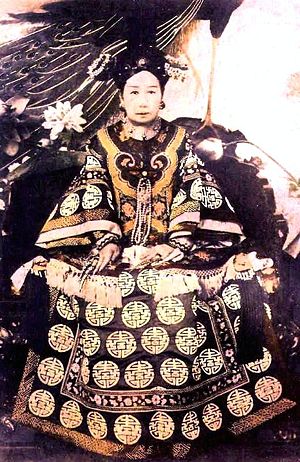Tzu-Hsi (pronounced "Tsoo Shee"), or Cixi, was one of the most formidable women in modern history. She was famed for her beauty and charm. She was power hungry, ruthless and profoundly skilled in court politics. She would rise from a middle class family to a dowager empress affecting Chinese life forever.

She was born on November 29, 1835. Her given name was Yehonala. She was born to parents of the middle ranks of Manchu society. By the time she turned 17, she was one of the concubines of the Emperor Hsien-Feng. "Tzu-Hsi", meaning kindly and virtuous, was her court name. When the emperor would chose to sleep with her, she would be escorted to his room by eunuchs and left naked at the foot of the bed. This was done in order to insure no weapons were brought into his room. The emperor had many wives and concubines, but only Tzu-Hsi gave him a son. Upon the birth of their son, she immediately moved up in the court and upon the death of her husband she was given the title of Empress of the Western Palace. Tzu-Hsi was now the dowager empress.
However, her relations with the Emperor were never that fulfilling. According to Wu, a noted Chinese historian, the relations between the two were never anything but strained. She resented all attempts on his part to exercise real power. Their fights were always a struggle for power between them. When the Emperor died in 1861, her son, Chih, became the Emperor. She was one of the eight regents named by the emperor to rule during Tung Chih's youth, since he was only five years old when he took the throne. The other seven regents could have removed her from power, but she had allies. With the support of Jung Lu and his banner men, revolutionary eunuchs, the empress seized control of the government.
However, she still could not rule openly; she had to rule through her son. When Chih turned 17, his mother's reign had come to an end. She selected a wife and four concubines for him, supposedly to keep him so busy that she could rule for him. After a few years, the emperor died of venereal disease in 1875 and Tzu-Hsi became ruler once again. However, the empress still was not totally free to rule, for her son's favorite concubine was pregnant and if she delivered a boy, the boy would be the new emperor and his mother dowager empress. Mysteriously, the concubine died before giving birth. Many historians conjecture that this was done at the request of Tzu-Hsi, while others simply believe that she was mentally unstable and took her own life.
Tzu-Hsi's legacy is clearly an important one. Whether the people liked her or not does not take away the pivotal role she played in the history of China. During her life in politics, Tzu-Hsi was clever and masterful. Her narrow-mindedness and ultra-conservatism in government policy delayed what China needed to do to keep pace with the rest of the world in the late 1800's.





